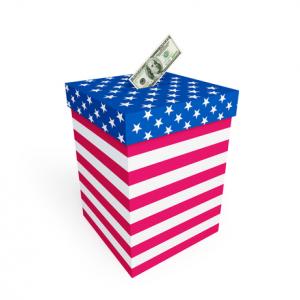Nick Penniman is president of United Republic, a new national nonpartisan organization working to eliminate the undue influence of special interests in American politics.
Posts By This Author
Moneyed Speech
The Supreme Court continues to dismantle campaign finance reform.
IN ITS SEEMINGLY endless quest to attack the few remaining pillars of our campaign finance laws, the Supreme Court issued a brazen ruling in McCutcheon vs. FEC, striking down the aggregate contribution limits that capped the overall amount individuals could give to candidates and political parties each election cycle. As it was with Citizens United—the 2010 decision that said corporations and unions could spend unlimited amounts—the court’s April ruling was striking not only in its naiveté about the effect of money in politics, but in its naiveté about the nature of the American experiment itself.
Whereas Citizens United focused on the nature of corporate spending in elections, this decision cuts straight to the chase. Should wealthy people have a greater ability to fund political parties and candidates—and benefit from the greater access and influence that awards them? The court sent a clear message about where it stands: Yes, they should. Chief Justice John Roberts, writing for the majority, even cloaked the decision in pious language, stating, “if the First Amendment protects flag burning, funeral protests, and Nazi parades ... it surely protects political campaign speech despite popular opposition.”
Traditionally the court has asserted that the government has an interest in preventing corruption and the appearance of corruption, the latter in order to sustain public faith in the democratic process. However, the McCutcheon decision defines “corruption” so narrowly that the original statute is essentially useless. The government can no longer prevent the appearance of corruption, and it would have a difficult time proving “quid-pro-quo corruption” occurred in the first place
But despite this disheartening fact, there’s a glimmer of hope. One of the unintended effects of Citizens United was that it created a major “teachable moment” for the public about campaign finance—an issue that had previously gained little attention and was easily misunderstood.
PACs Gone Wild
Big Money's corrupting influence on the elections is way out of hand. Here's how to fix it.
JUST AFTER THE election, a New York Times editorial implored the president and Congress to "get to work fixing the current badly flawed, out-of-date campaign finance system." The Kansas City Star called it "painfully obvious" that the system needed change.
Those were after the 2008 and 2004 elections.
We all know how the cycle works: Every four years, politicians mount ever-more-expensive campaigns. After each election, the nation's papers call for reform. Meanwhile, business as usual—the business of the lobbyists, that is—continues in Washington.
So here's a proposal: Let's put an end to this cycle. Call it the "Reform in Four" campaign.
Step 1: Build a bigger army. We need to immediately broaden the coalition for reform—from environmentalists to the faith community to pro-reform Republicans, corporate leaders, and Tea Party members who are concerned about cronyism. The good news is that, in a July 2012 Gallup poll, 87 percent of Americans said that "reducing corruption in the federal government" should be a "very important" or "extremely important" priority for the next president. It ranked second, just below job creation (at 92 percent).
Rotten to the Core
With political integrity drowning in big money, it's too late for small tweaks. The whole system needs a reboot.
LATE LAST YEAR, President Obama made a pilgrimage of sorts to the sleepy town of Osawatomie, Kansas, to talk about the economy. He went there because it’s where, in 1910, Teddy Roosevelt gave one of his most famous speeches, called “The New Nationalism,” which was, in part, an attempt to unite his party around a common vision of a well-managed economy.
Obama’s mission was similar, although more focused on philosophically framing up the 2012 elections. The White House communications staff had built up expectations about the speech, and the president delivered, movingly describing how America can better encourage innovation, shore up the middle class, and expand opportunity. For the most part, the media were aglow.
A few minutes in, he quoted from Roosevelt’s speech: “‘Our country,’” Obama said, “‘means nothing unless it means the triumph of a real democracy ... of an economic system under which each [person] shall be guaranteed the opportunity to show the best that there is in him [or her].’”
But, notice those ellipses. What he omitted was an important phrase from the original quote: “the triumph of popular government.” Five words may not seem like much. Perhaps the president felt as if “real democracy” said enough, or perhaps his speechwriters felt as if it wouldn’t be politically prudent for him to speak so highly of government. But the omission also points to a larger exclusion, not just in Obama’s speech, but in his presidency and, most significantly, in our country’s priorities.
